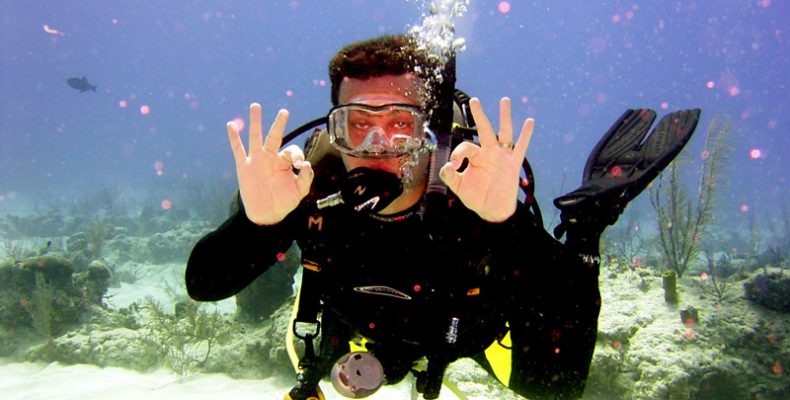First, it is always highly recommended to speak to a doctor before undertaking any new physical activity or beginning any kind of workout regime, whether you are overweight or not. You may be required to have a doctor’s permission, if you have any medical issues.
Scuba is one of the most amazing, non-competitive activities that most people can get involved in. Normally, scuba diving is a fun and relaxing activity, however, as with any outdoor sport, on occasion, unanticipated events can and do take place. When these events happen, every diver should be able to take care of himself and his dive partner while underwater or at the surface.
Are there are limitations on who can dive, or is it dangerous for someone who is overweight to dive?
Obesity is defined as an excessive amount of body fat greater than 25 percent in men and 35 percent in women. Another measurement to determine body composition is called a Body Mass Index, or BMI. A BMI is used to assess weight relative to height, and can help determine whether an individual is obese, overweight or underweight.
If you are one of the many Americans today who is considered overweight or obese, don’t fret. You can still enjoy a great time while scuba diving. There are some considerations you may not have thought about, so let’s dive into those.
- You may have to use more weights on your belt, which under water may not bother you, however getting in and out of the boat with this extra weight may prove bothersome.
- 2) You may have to have a custom wetsuit made, which is always a good idea rather than using a wetsuit that someone else has been using.
- Being overweight or obese can have adverse effects in divers. This includes having a higher risk of developing diving related issues such as decompression sickness (DCS). As well as other non-diving related issues that can impact on a person’s fitness to dive and diver safety.
When you are obese you have an increased fat content of the body. Nitrogen (or other inert gases) slowly build up in fat cells and take a longer time to dissipate. This means obese people will have a bigger inert gas load over a diver than somebody with a body weight in the healthy range. This means that obese people are more likely to develop DCS. Circulation is a key factor in removing nitrogen from the body, however, excess fat can take additional time before the nitrogen can be removed. In addition, some dive computers are programmed with dive tables based on studies done on people with a weight in the healthy range. As they are not adjusted based on body fat content this increases the risk of DCS in obese divers.
Lastly, it is well established that obesity increases the incidence of many other medical conditions such as diabetes, heart attack, high blood pressure, lung disease, gastro-esophageal reflux and stroke. These conditions can cause further complications when diving which, in the worst cases, can cause death when scuba diving. Individuals with Type II diabetes have generally been excluded from scuba diving because a possible loss of consciousness might pose a significant risk, affecting the diver’s ability to take care of himself/herself or his/her dive partner.
Recommendations; dive conservatively! The tables and computers for diving should never be exceeded, however, no one needs to go to the max. Leave room for error and end the dive early if any signs of fatigue occur.
We have found that deeper dives are not as pretty, as by 30 to 40 feet, light penetration is greatly reduced for red, orange and yellow wavelengths, and without a light source, you will not see the true colors. So deep dives are not necessary if all you would like to do is see the coral reefs.
If you are overweight or obese it is strongly recommended or required that you see a doctor before undertaking any diving activity. It is likely that you will be required to have a face to face medical where many factors other than your weight (such as cardiovascular fitness) will be considered. Your doctor can then advise you on steps to improve your fitness to dive if required or may restrict the type of diving you can do in order to keep you safe.
So in most instances, no, you are not too fat to dive! As long as you are aware of your limitations, you should do just fine. And the way you learn about your limitations, are to start slow, and get used to the water. Which is why, ScubaBears starts you out in a tropical pool so we can assess your skills and train you in the proper way to scuba dive.
But on a positive note, kudos to you on taking the first steps toward healthy lifestyle changes and a vibrant and exciting way to get physically fit, through scuba diving.


Recent Comments